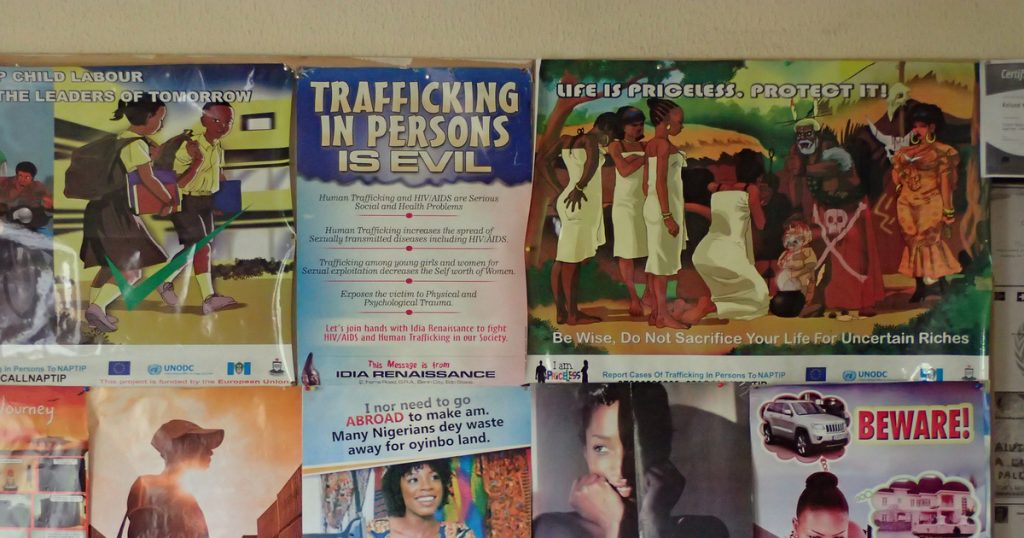Traditionally, when one imagines how someone ends up in slavery of any kind, one sees images of people being forcibly taken from their homes and sent to a foreign country, with absolutely no say in the matter. While this is usually the case in sexual slavery and for other kinds of bondage, it is no longer the case for women from Edo State in Nigeria, that provides 80% of women trafficked into Europe.1 Instead, there is a new phenomenon where women seek out passage to Europe through Madams, knowingly entering into prostitution. This was not always been the case, but extreme poverty, where some even lack running water, this practice has begun flourishing.2

Previously, recruiters lure women with tales of jobs in Europe, working for wealthy families, being hairdressers or nannies, only to find out the harsh reality of forced sex work once they arrived. Eventually, returning with embellished stories of wealth to tempt and recruit women themselves, completing the vicious cycle from victim to perpetrator. Some of the Madams even live in lavish houses, behind gates, as a testament of just what can be earned in European sex work. This show of wealth, in a desperate state, slowly began to transform just how women were recruited into the sex trafficking world.3
More recently, traffickers are being sought out by their victims in hope for a better life for themselves and their families.4 Little do they know of the harsh conditions and abuse they will endure before they can ever return home. After discussion of the “terms” of the work, the women sign legally binding contracts that say they will pay back rent, travel expenses, food, and other miscellaneous expenses, sometimes in a matter of months, sometimes in many years. These expenses total anywhere from 30,000 to 60,000 US dollars, on average. Usually, the women charge 5 to 10 US dollars per client, requiring them to work from sunup to sundown, and sometimes longer.5

Aside from relying on the signed contracts, Madams and pimps use the threat of violence against families, and religion, to keep the women from leaving.6 Using black magic referred to as JuJu, priests perform complex rituals that include eating raw chicken hearts, harm to oneself, drinking cocktails of their own fingernails, hair, and blood, as well as other methods, to bind the women with their traffickers. After completion of the rituals, they are made to feel that death, insanity, or harm will come to their families if they are to break their oath of repayment. A priest, who has benefited greatly from Madams and the pimps he has helped, stated in an interview that the purpose of these rituals are that “she never sleeps well or has peace of mind until she pays what she owes.”7

Furthermore, religion and belief in the negative effects that stem from the severance of the oaths have even led parents to become more complacent and insist that their daughters follow the requests of the people who are exploiting them.8 This, coupled with extreme poverty, exacerbate the growing phenomenon in Edo State, rendering it even more difficult to combat. Though, there are efforts to better the lives of women in Edo State. Education promotes agricultural development and other “basic needs industries,” and is central to the campaigns to inform about the horrors and negative effects of trafficking, and working toward the decriminalization, not legalization, of prostitution to help, instead of punish, those who have been ensnared in a vicious cycle of abuse which is making strides.9
New policies and rules are being implemented and promoted by grassroots organizations, and governments are taking notice. On November 15, 2000, the UN established a “Protocol to Prevent, Suppress and Punish Trafficking in Persons, Especially Women and Children, supplementing the United Nations Convention against Transnational Organized Crime,” which has 173 signatories, showing the world that these malum in se actions have become malum prohibitum or universally illegal, and punishable internaitonally.10 Even with all of these measures, and the recognition of this epidemic at an international level, there are still roughly 4.8 million people (19% of all humans trafficked) enslaved for sexual exploitation in the world, bringing in 99 billion dollars annually (66% of all profits from human trafficking).11 More must be done to end all forms of human trafficking, and it starts with a deeper understanding of the differing local and cultural patterns of recruitment throughout the world. Education and the provision of alternative work options remain the most powerful deterrents.
- Seema Kawar, From Benin City to the Shores of Italy: A New Hub of Human Trafficking, NAOC, (Accessed January 31, 2018), http://natoassociation.ca/from-benin-city-to-the-shores-of-italy-a-new-hub-of-human-trafficking/. ↵
- Abaobi Tricia Nwaubani, Cycle of exploitation turns Nigerian sex slaves in Italy into traffickers, News.trust.org, (Accessed February 12, 2018), http://news.trust.org/item/20161108000327-qfsaw/. ↵
- Abaobi Tricia Nwaubani, Cycle of exploitation turns Nigerian sex slaves in Italy into traffickers, News.trust.org, (Accessed February 12, 2018), http://news.trust.org/item/20161108000327-qfsaw/. ↵
- Abaobi Tricia Nwaubani, Cycle of exploitation turns Nigerian sex slaves in Italy into traffickers, News.trust.org, (Accessed February 12, 2018), http://news.trust.org/item/20161108000327-qfsaw/. ↵
- Esohe Aghatise, Iroko Onlus: Working to Combat the Trafficking of Nigerian Women and Girls Into Italy, Canadian Woman Studies 22, no. 3/4 (2003): 197-199, Humanities Full Text (H.W. Wilson), EBSCOhost (accessed January 31, 2018). ↵
- Esohe Aghatise, Iroko Onlus: Working to Combat the Trafficking of Nigerian Women and Girls Into Italy, Canadian Woman Studies 22, no. 3/4 (2003): 197-199, Humanities Full Text (H.W. Wilson), EBSCOhost (accessed January 31, 2018). ↵
- C. S. Baarda, Human trafficking for sexual exploitation from Nigeria into Western Europe: The role of voodoo rituals in the functioning of a criminal network, European Journal Of Criminology 13, no. 2 (2016): 257, Complementary Index, EBSCOhost (accessed January 31, 2018). ↵
- Abaobi Tricia Nwaubani, Cycle of exploitation turns Nigerian sex slaves in Italy into traffickers, News.trust.org, (Accessed February 12, 2018), http://news.trust.org/item/20161108000327-qfsaw/. ↵
- Esohe Aghatise, Iroko Onlus: Working to Combat the Trafficking of Nigerian Women and Girls Into Italy, Canadian Woman Studies 22, no. 3/4 (2003): 197-199, Humanities Full Text (H.W. Wilson), EBSCOhost (accessed January 31, 2018). ↵
- United Nations, Protocol to Prevent, Suppress and Punish Trafficking in Persons, Especially Women and Children, supplementing the United Nations Convention against Transnational Organized Crime, International Law & World Order: Westons & Carlsons Basic Documents, November 15, 2000, doi:10.1163/2211-4394_rwilwo_sim_033351. ↵
- Human Trafficking by the Numbers, Human Rights First, January 7, 2017. (Accessed February 12, 2018), https://www.humanrightsfirst.org/resource/human-trafficking-numbers. ↵



90 comments
Angelica Padilla
It is sad how human trafficking is still something we hear about almost everyday in the news. And how it happens almost all around the world, so it’s interesting hearing about the trafficking in Nigeria. It’s terrible how they tricked women into thinking they will have jobs but they were just being captures for sex trafficking. No one should be part of this kind of abuse.
Esperanza Mauricio
The horrible reality that these women face is heavily centered around the beliefs that encompass their culture. The people who bind them into this lifestyle have decided to infiltrate their minds through means of placing a huge mass of guilt and a false sense of responsibility. They tell them that generations of their family members will be cursed if they do not comply, which leads them towards a guilty conscience. This article further exposes the lowly techniques that an organized group of individuals will use in order for compliance. A sad reality for many individuals who are not given a system in which the voices of the masses are heard.
Lewis Wilson
I really enjoyed reading this article and was slightly surprised at the topic. I enjoy reading articles on things that are so far from us but still very important in the world. It is a very upsetting topic but I thought you did a great job with it. It was very interesting to learn of the issues in a country like Nigeria as I was not aware it was that big of an issue in African countries.
Arianna Kennet
I have read this article before and even though it is the second time reading it, I still feel the same sorrow for those mentioned in the story as I did the first time around reading this. Human trafficking is a sick thing and the sad part is that it still exists till today. What these women went through, being tricked into believing that they had a good future only to find out what they really signed up for is much worse, is so sickening.
Julio Morales
Its crazy to think that life in Nigeria is bad enough to convince women to enter prostitution voluntarily just to be able to move to Europe. The cycle of women that were previously tricked into prostitution tricking other women to go into prostitution is even crazier. I don’t understand how women who experienced the sexual abuse are okay with submitting other women to the same abuse that they endured. It’s good to see that their are organizations that are implementing policies to stop human trafficking.
Samire Adam
This article about trafficking included all types of abuse you could think of. Beside the sexual and physical abuse, the women are facing emotional and finical abuse when they arrive to a land that is foreign to them where they most likely do not speak the language or understand the culture to seek assistance. the religious contract they are forced to take part in cause them emotional distress as they worry about something horrible will happen to their family if they escape.
Anais Del Rio
This article just proved that even with laws in place there is still human trafficking happening around the world and sometimes even in our hometown. I didn’t know that these pimps or madams made the women swear oaths to pay back their debt, and it would make sense why the women would not run away despite the harsh conditions. I would hope that at one point there is more being done to help prevent any more women being exploited just for the blind hope of a better future somewhere else.
Christopher King
It is an awful thing that these women are being exploited and in a way forced to sell themselves in a foreign country or even at all. People are making them promises of wealth and threatening their families in order to force them into sex trafficking. I like this article talking about how things such as this can be solved with something as simple as education and the emergence of NATO attempting to stop the trafficking. It seems simple but in a place that feels that they have no choice but to sell themselves it becomes a great challenge. This article is well written in describing how these people get tricked into doing these things with hardly any income out of it and the constant threats against their families using JuJu.
Ana Gonzalez
It is terribly saddening the way that women voluntarily sign up for prostitution because they suffer from poverty and famine, as the author explained is the case for women in Nigeria. I also found it terrifying the way these women are forced by pimps to perform rituals that hard their bodies to convey that their families will suffer if they don’t work. No one should ever be exposed to such treatment. The author did a great job of explaining this case of human trafficking, which I knew nothing of.
Maria Mancha
Its so upsetting knowing that Human trafficking still exist. It’s a horrible thing. I think it was really horrible how they tricked women into thinking they would have jobs in Europe while in reality they were just being captured for sex trafficking. Also how they threatened their families to force them to stay and not leave. I think it was interesting to learn about sex trafficking in Nigeria. I learned a lot from this article and I believe it was well written.